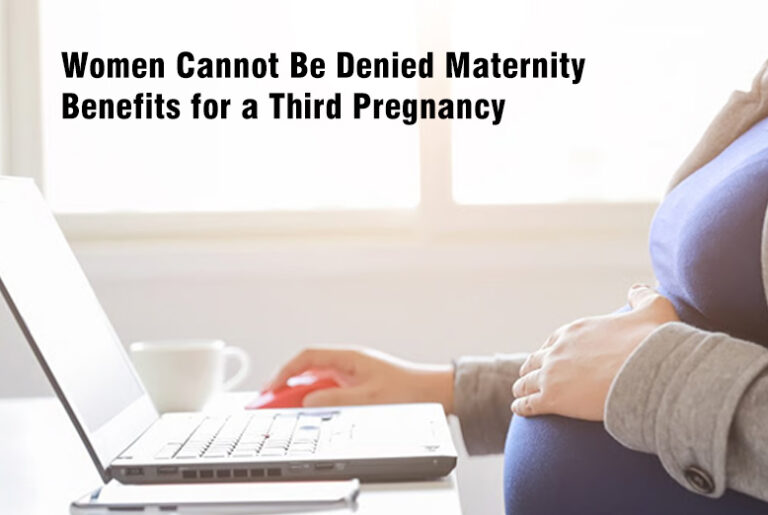In a landmark ruling, the Madras High Court reaffirmed that maternity rights cannot be limited by the number of pregnancies. The judgment clarifies that maternity leave and associated benefits are designed to safeguard a woman’s physical and emotional well-being during pregnancy, not to restrict her based on arbitrary service rules. For working women covered under maternity insurance or corporate health insurance plans, this decision reinforces the assurance of equal and uninterrupted protection throughout their motherhood journey.
Case background
The case involved B. Ranjitha, a junior assistant at the Ulundurpettai court in Tamil Nadu, whose request for maternity leave from August 18, 2025, to August 17, 2026, was denied because it was her third pregnancy. The authorities cited service regulations limiting such leave to two pregnancies.
Ranjitha challenged the rejection, explaining that her first two pregnancies occurred before she joined government service, making the denial both discriminatory and unreasonable. The High Court agreed, ruling that maternity benefits cannot be denied simply because a woman is pregnant for the third time.
The High Court’s observations
The bench of Justices R. Suresh Kumar and Hemant Chandangoudar quashed the rejection, calling it “illogical and unreasonable.” They stated that maternity benefits are meant to support women through the physiological and emotional challenges of pregnancy and postnatal recovery, regardless of how many times they have given birth.
Citing the Supreme Court’s Umadevi vs. Government of Tamil Nadu ruling, the court reaffirmed that every working woman is entitled to maternity protection under the Maternity Benefit Act, 1961. This decision ensures that women’s reproductive rights are respected, and they are not penalised for natural family choices.
Promoting gender equality in the workplace
The court’s verdict sets a progressive precedent, urging both government departments and private employers to review their policies. Denying leave based on pregnancy count contradicts Article 15 of the Constitution, which prohibits discrimination on the basis of sex.
By ensuring maternity benefits for all pregnancies, the court’s decision promotes a culture of inclusion and respect for women in the workforce. It sends a message that career aspirations and motherhood should coexist harmoniously, without one hindering the other.
What this means for policyholders
For women with maternity insurance, the ruling provides crucial reassurance. Insurers cannot deny or restrict claims for delivery or postnatal expenses due to multiple pregnancies. Likewise, comprehensive health insurance plans covering maternity benefits will continue to remain applicable for each childbirth, supporting women financially through every stage.
This also encourages couples to plan their families without worrying about losing insurance coverage or medical benefits for future pregnancies. It empowers women to make reproductive decisions confidently, knowing their healthcare and financial needs will be supported by law and policy alike.
The role of Bajaj Health Insurance in supporting maternity care
Bajaj Health Insurance offers tailored plans that include maternity and new-born care coverage, ensuring cashless hospitalisation and access to quality healthcare. These policies cover both normal and caesarean deliveries, pre- and postnatal care, and medical check-ups.
Following the High Court’s ruling, such inclusive coverage becomes even more meaningful. Bajaj Health Insurance’s commitment to supporting women’s health aligns perfectly with the spirit of the judgment — promoting equal access, affordability, and continued protection across all pregnancies. The company’s strong focus on preventive healthcare and family-friendly plans ensures that women receive care beyond hospitalisation, helping them focus fully on recovery and family well-being.
Importance of comprehensive maternity coverage
Rising medical costs make maternity insurance a crucial safety net for families. Quality maternity care often includes multiple scans, consultations, and post-delivery recovery expenses, which can add up quickly. A reliable policy helps cover these costs, reducing financial strain and ensuring that women receive uninterrupted care.
Bajaj Health Insurance also provides family-oriented health plans that include maternity benefits, offering flexible coverage for working women and new mothers. These plans combine preventive healthcare, medical assistance, and wellness perks, supporting women before, during, and after pregnancy.
A message for employers and insurers
Employers must ensure that their maternity and leave policies comply with the law. Insurance companies are also encouraged to align policy terms with inclusive practices that support women at every stage of motherhood. The High Court’s judgment reiterates that maternity is a right, not a privilege, and should never be denied for procedural reasons.
By fostering supportive workplace environments and expanding protection through providers like Bajaj Health Insurance, India can take a decisive step toward gender equality and social progress. The combination of progressive legal protection and comprehensive insurance support builds a framework where every woman can experience motherhood with dignity and security.
Conclusion
The Madras High Court’s verdict is a milestone for women’s rights in India, confirming that maternity benefits cannot be denied for a third pregnancy. It upholds the principle that motherhood deserves full protection and respect under the law.
For families relying on maternity insurance or health insurance, this ruling guarantees continuity of medical and financial support across every childbirth. With inclusive policies and forward-thinking legal measures, Indian women can now embrace motherhood with confidence, knowing their health, dignity, and future are safeguarded.
Also Read: Top 5 Platforms to Buy Health Insurance Online in India



